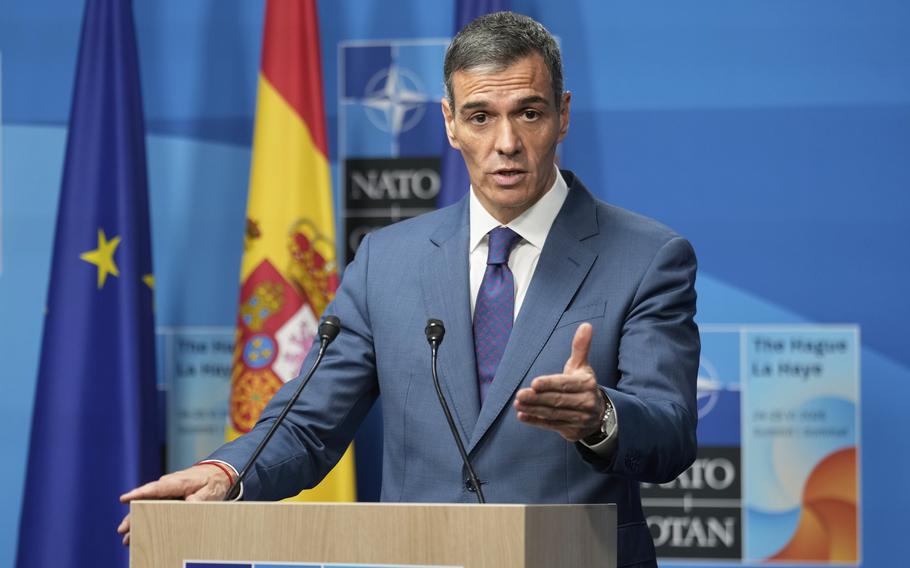Europe
Spain’s leader sticks by decision to break with NATO on spending despite Trump tariff threats
Associated Press June 26, 2025

Spain's Prime Minister Pedro Sanchez speaks during a press conference after the plenary session at the NATO summit in The Hague, Netherlands, Wednesday, June 25, 2025. (Markus Schreiber/AP)
MADRID — Spanish Prime Minister Pedro Sánchez walked away from this week’s NATO summit with an opt-out from spending more on defense. He also left with fresh threats of tariffs from U.S. President Donald Trump.
On Thursday, the progressive Spanish leader stuck by his decision to break with NATO allies and responded to Trump’s comments by pointing out that the European Commission — and not Spain — was who decided the bloc’s trade policy.
“What is clear is that trade policy is a policy directed from here, from Brussels,” Sánchez said. “Spain is an open country. It is a country that is friendly to its friends, and we consider the United States a friend of Spain.”
At the military alliance’s summit Wednesday, members agreed to raise their defense spending to 5% of GDP. But Sánchez secured a last-minute exemption, saying that Spain will only spend up to 2.1%, which he called “sufficient and realistic.”
Trump criticized Spain after the summit, saying the country wanted “a little bit of a free ride,” and that it would “have to pay it back to us on trade” through higher tariffs.
How Sánchez’s gamble could play out was up for debate on Thursday.
“It is not always easy to interpret exactly what Mr. Trump means,” Belgian Prime Minister Bart De Wever told reporters at an EU summit. “How he wants to impose import tariffs on Spain separately is a mystery to everyone. Could this perhaps concern specific products from Spain? We will have to wait and see.”
Spain’s move on the international stage comes at a complex moment for Sánchez at home as corruption cases involving his inner circle have ensnared his Socialist party and resulted in louder calls — even from some leftwing allies — to announce early elections. So far, Sánchez has refused.
“To Trump’s theatre, Sánchez responds with something similar,” said Montserrat Nebrera, political analyst and professor of constitutional law at the International University of Catalonia. “Domestic problems are piling up, and this resistance to meeting the arbitrary 5% target also seeks to wink at his partners most critical of defense spending.”
Spain was NATO’s lowest spender last year, according to the alliance’s estimates, spending around 1.28% of its GDP on defense expenditure. In April, Sánchez announced that the country would reach 2% this year, for which he was criticized by some leftwing allies.
On Thursday, Antonio Garamendi, president of the Spanish Confederation of Business Organizations, criticized Sánchez for the spending opt-out.
“We have to stick with with our allies and not going along with the other Europeans is an error, and even more so if that increases the chance we will be punished,” Garamendi said.
While Spain is under the umbrella of the European Union, which negotiates trade deals on behalf of all 27 member countries, it could still be targeted by tariffs that hit its most vulnerable industries, Garamendi said.
He specifically pointed to Spanish steel, cars and olive oil sectors.
“There are industries that can be impacted, and that has to concern us,” he added.
Wilson reported from Barcelona. AP journalist Lorne Cook contributed from Brussels.